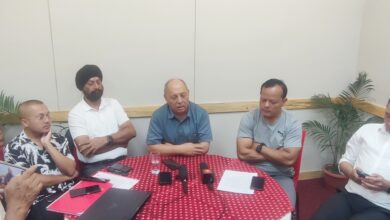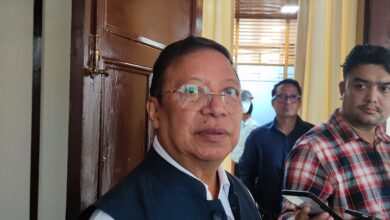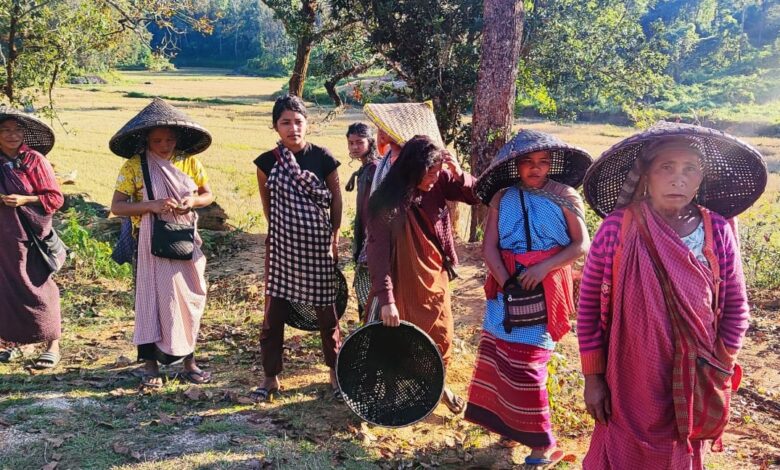
Nineteen years, and history repeats. Another border violence, this time with the Assamese authorities, where firing by Assam police led to the killing of five Pnar villagers at Mukroh. In 2003, it was the Karbi militants who gunned down six villagers, all farmers, here. The village is mourning again and the anger against the state government is seething as for decades, their safety and security have been overlooked.
During a visit to Mukroh in West Jaintia Hills, more than 100 km from Shillong and a four-hour drive without traffic on Shillong-Jowai Road, on December 3, the village looked peaceful. That there was a gruesome incident only 10 days back was barely palpable. Nonetheless, the families are still mourning and coming to terms with reality. However, the reality was ignored by the government and authorities concerned for decades.
Sik Talang (53) was going to his field to take stock of the harvested paddy. Meanwhile, the protest started as the Assam police and forest guards arrested three persons and detained a truck loaded with timber. The Mukroh villagers wanted the three arrested men to be released. Talang’s curiosity made him a victim.
“I only knew that he went to the paddy field. The harvested crop has to be taken care of and the unharvested one has to be taken. When a few youngsters came and informed me that he was shot dead, I was shocked. How can that be,” said Ploda Sumer, Talang’s wife.
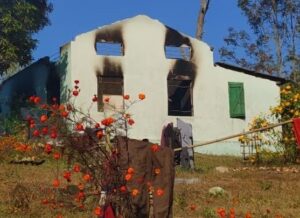
As Sumer narrated the sequence of events on that fateful morning, her two sons listened intently. Boelit Sumer, the eldest of the five siblings, was hesitant to talk initially. But as the conversation with the family members progressed, he opened up. “We are farmers and have our fields beyond the incident site. We face problems every day but no one listens to us,” he said.
Agriculture is the main source of livelihood in the fertile village. There are many daily wage earners too. Apart from the road funded by North Eastern Council, there was barely any sign of development in the border village, which is blessed with abundant natural resources. Several dumpers carrying timber can be spotted on the way.
The tin-roofed house and the makeshift walls with plastic sheets are tale-telling of the abject poverty. Sumer and other members of the family stood in the blazing sun, explaining what had happened on November 22. The dogs barked, the pups moaned and Sumer’s granddaughter, a toddler, walked aimlessly around the paddy left unnoticed to be dried.
“Some youngsters came to inform me that he was shot. I was quite unnerved and after hearing the news, I fainted. Later, political leaders came to visit the family, Aiborlang Shadap, the MDC (from NPP) was the first. The MLA (Nujorki Sungoh) came much later,” she said.
The embers of discontentment were burning for a long time. The residents of the border village have been complaining about the high-handedness of the neighbouring state for decades, “but none responded”. They wanted a police outpost but the government never paid heed to the demand. Chief Minister Conrad Sangma said on November 22 that police personnel were commissioned for duty on November 25, but the ground reality was far from what was claimed.
Talang’s family was frustrated. So were the relatives of Tal Nartiang and Chirup Sumer. The others who died were

Thak Shadap and Nikhasi Dhar. For years, they have been complaining to the authorities, both police and administration, about the harassment by Assam police and forest guards but none paid any heed. “Even the government knew about our problems. We wanted a police outpost and the demand was since the eighties. The state government sanctioned an outpost only recently but we do not see it,” said Sumer.
More than 17 km of the road from Barato is bumpy. But the road from Barato to Mokoilum, over 15km, is a smooth ride. The stretch was developed under the North East Road Sector Development Scheme. Along the road were paddy fields and a variety of fruit and vegetable plantations. Two battalions of BSF, one each from Assam and Meghalaya, were on guard. The Assam police, who were posted at the forest outpost after the firing incident, claimed that the Assam border started 1 km before the temporary BSF camp.
“This is Assam where you are standing. This is where the forest outpost was burned. You are not allowed to come here,” said C Hazarika, who is in charge of the outpost at present. The soft-spoken police officer told the journalists to go to the Mokoilum police outpost for further information. However, his junior colleagues were aggressive and annoyed at the journalists who wanted to take a photograph of the burned building. They yelled at a senior journalist for coming up to the main building even when they were told that the elderly journalist could not walk.
“The earlier forest guards have been shifted after the incident. We are Assam police and were posted a few days after the firing. We cannot give much information, but yes, illegal timber felling is on along the Assam-Meghalaya border,” said Hazarika.
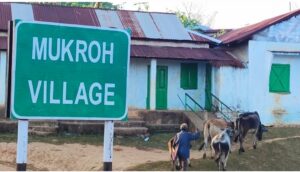
While Assam police claimed that the area belonged to them, a group of villagers from Mukroh who were going home after fishing said otherwise. “We have farmlands here. This is our land,” said an elderly woman, who was resting with a few others after a hard day’s work.
The villagers whom Sunday Monitor spoke to said they faced harassment every day as Assam police would stop them and ask for money. “Even for collecting forest produce, like firewood and dry leaves, they would take money from us. They would search our bags and take away money. We have to pay to go to our fields. We did lodge complaints with the district administration and the Meghalaya police. But none reacted or bothered about our plight,” said Sumer.
The BSF men are posted where the firing took place. A few yards away, there are Meghalaya police officers, who looked perplexed when met with the media.
The Mokoilum police outpost is part of the West Karbi Anglong district. The village has both Pnar and Karbi populations. Curious eyes followed the strangers from Shillong as they stopped by a grocery shop to have tea and buy edibles. “Where are you from?” was the common question.
Faiz Ahmed Barbhuiyan, the additional SP at the outpost, was welcoming. “I came here just four days back and am yet to go through the reports. I cannot comment much on the incident,” he said apologetically.
However, Ahmed was categorical about the crime committed at Mukroh. “A crime is a crime. It does not matter who commits it. Let us wait for the judicial inquiries (both Assam and Meghalaya have ordered judicial inquiries into the incident, besides seeking a CBI probe into the matter),” he added.
Ahmed narrated the other side of the story. He said the Assam home guard who was on forest department duty,

Bidyasing Lekhte, was only 21 years old. “He was lynched by the protesting villagers. What was his fault? He was doing his duty. He has two children, one a baby… What are we fighting for? It is the same country and how can you put check posts or border pillars inside the country? Anyway, the Centre has to decide and not the states,” the police officer said.
When asked about the illegal timber trade, Ahmed was discreet. “I am new here. I have to find out.”
The Meghalaya chief minister told the media on the day of the firing incident that Mukroh was not a disputed area. A day after, in a U-turn, he said the clash was part of a border dispute. Whether or not it was a border clash, the fact remains that six lives were lost. None is sure where the border starts and who owns the vast stretches of fertile land. While the Assam authorities say the land is within their jurisdiction, the villagers claim otherwise. The Meghalaya police posted there have nothing to say. The question remains, “Whose land is it anyway?” While the governments of the two states take their time to answer it, innocent lives are lost on both sides of the border, for which the State is answerable.
~ Team Sunday Monitor

